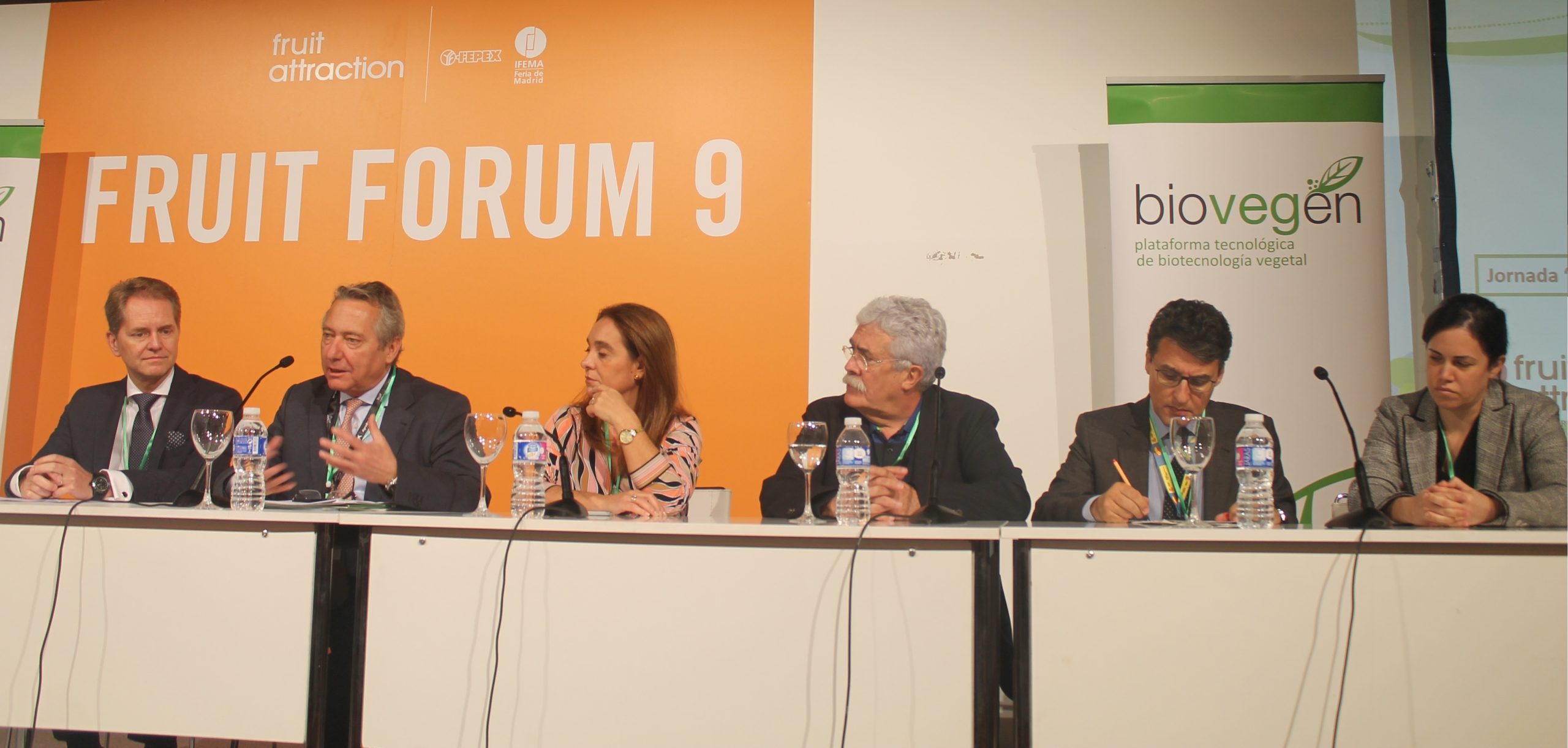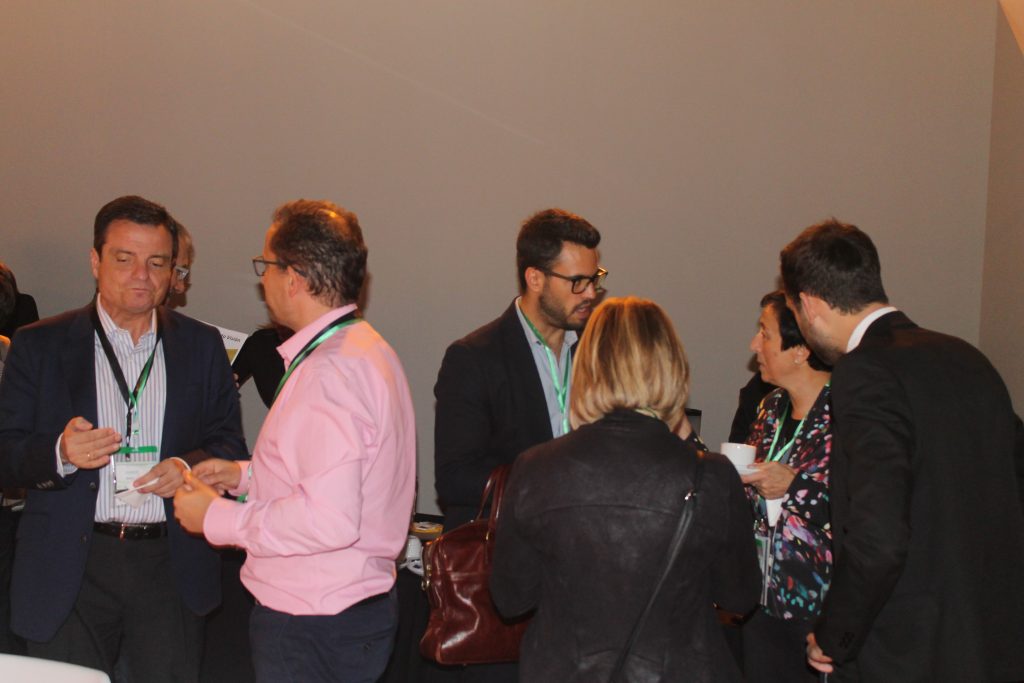Conclusions of the Conference “TECHNOLOGY ATTRACTION: Science, Business and Technological Revolution”

On October 19, 2017, the BIOVEGEN Conference “TECHNOLOGY ATTRACTION: Science, Business and Technological Revolution”. The event, held within the framework of the FRUIT ATTRACTION International Fair (IFEMA, Madrid), brought together about 200 agents of the agri-food sector with R&D activities, coming from the research, business and Administration fields.
- 87 companies (improvement, production, marketing, agrobiotechnology, nutrition, plant health and protection, R&D management, etc.)
- 37 Research Organizations (Universities, OPIs)
- 13 Others (Administration -CDTI, MINECO, MAPAMA, OEPM, OEVV...-, embassies, regional councils...)
The objective of the Conference was to bring together prominent representatives of Spanish Science, Business and Administration to convey the technological revolution that is taking place in Plant Biology, thus highlighting the crucial tool for competitive improvement that these advances provide to the plant production sector, and What is the international context and trends in this regard. During it, renowned experts (see curricular reviews) in the field of Plant Biology and the agri-food sector showed the current panorama, approached from the perspective of Science, Business and Administration.
The opening of the Conference, which was led by the current director of the INIA, Manuel Láinez, was also attended by José Pellicer, President of BIOVEGEN and Antonio Leyva, Executive Secretary of BIOVEGEN. The three welcomed the attendees and presented the Conference that, held within the framework of the Fruit Attraction Fair, sought to contribute to a greater rapprochement between Technological Supply and Demand, to make investment in research profitable and to develop collaboration opportunities. and business.

Next, Gonzaga Ruiz de Gauna, director of BIOVEGEN, publicly outlined the draft of the document 'Analysis of the Agri-Food Sector and proposals for improvement in R&D&I' carried out by this entity. This document, which will be developed over the coming months and is open to contributions from the entire sector, aims to serve as a tool to contribute to improving the situation of knowledge and technology transfer and the private sector's use of investment opportunities. business development that R&D offers.
José Pio Beltrán, former president of EPSO (European Plant Science Organisaiton) and Spanish scientist who is currently researching at the Institute of Molecular and Cellular Biology of Plants (IBMCP-CSIC) made the first presentation agreeing with his fundamental diagnosis: Spain is a great agricultural power, it has important and quality scientific production, an impressive network of leading public organizations (20 agricultural centers attached to the CSIC, 17 regional ones coordinated by the INIA, 37 universities with activity in biotechnology as well as another 32 technology parks) but an atomized agri-food business structure, far from the world of science and that does not value innovation sufficiently as a factor of competitiveness.

Secondly, Marta Tortajada approached her presentation from the perspective of the private sector, specifically, that of a Valencian company that develops biotechnological products, such as probiotics, with applications in functional foods.
Next, the head of Innovation Affairs at the CEOE, César Maurín, offered the vision of his institution and demanded a paradigm shift in incentives for agricultural R&D: «One of the problems of these programs is that they do not They execute a good part of the budgets. Plans based on partially repayable credits have not been interesting in many cases and it would be advisable to give more weight to the subsidy and less to the loans.
María Ángeles Ferre (responsible for the scientific-technical thematic programs of the State Research Agency, Ministry of Economy, Industry and Competitiveness), for her part, highlighted the evolution of the public-private project financing programs that her department manages, as in the case of the Challenges-Collaboration call, and highlighted that, in this program, "the percentage of agri-food companies that benefit from our credits is higher than that of other strategic sectors, such as energy and transportation." In addition, he advanced the details of the imminent Challenges-Collaboration 2017 call, endowed with a €400 million budget (€100 million subsidy and €300 million credit).

The Conference also featured a round table in which all the speakers and attendees were able to engage in a discussion on the situation of R&D in the Spanish agri-food sector. Some of the topics discussed were the following:
- The Spanish sector is good at doing research with money, but average at making money with research (“we investigate but we don't innovate”)
- It is essential to break the Science-Business disconnection to be competitive in innovation, and not only in production costs
- To do this, it is necessary to articulate tools that facilitate this approach: financing mechanisms, innovation agents, etc.
- One of the main problems is that the budgets dedicated to R&D are not executed in a high percentage
- Direct contact between researchers and companies needs to be promoted, so that companies can transmit their technological needs to them and researchers can advise them on the possibilities that open up to them with new technologies (researchers as “technological advisors”)
- There is a need for meeting forums between research and business
- It is necessary to move towards a new paradigm where subsidy is prioritized to share risks with the private sector and achieve greater execution of budgets
- Technological Platforms are a valid and effective project promotion agent, supported and coordinated by the MEIC for some time and which are demonstrating their positive impact.
- In addition, a horizon is opening towards greater public-private collaboration by administrations, both national and European, where there will be more programs and investment for Science-Business projects.
Finally, the General Director of Agricultural Productions and Markets of the Ministry of Agriculture and Fisheries, Food and Environment, Fernando Miranda, closed the Conference by defending the need for initiatives such as BIOVEGEN to link science with business, offering the latter more opportunities to undertake innovation . In addition, he announced that Spain will defend a regulation "based on science, away from the GMO straitjacket" for genomic editing (New Plant Breeding Techniques) and stated: "we are good at making innovation with euros but regular at making euros with innovation."

The Conference made clear the business development opportunities provided by new techniques in plant biology, and highlighted the growing importance of technological development for improving the competitiveness of the Spanish agri-food sector. Finally, a cocktail was offered to attendees that served to promote interactions between the public and private sectors through representatives of the numerous entities that attended the event.
Gallery
Program and presentations of the day
12:00 p.m. Welcome and introduction
- José Pellicer. R&D&i Director EUROSEMILLAS Group. President BIOVEGEN
- Antonio Leyva. Scientific Researcher. CNB-CSIC. BIOVEGEN Executive Secretary
- Manuel Lainez. INIA Director
12:15 p.m. BIOVEGEN Vision Document Preview
- Gonzaga Ruiz de Gauna. BIOVEGEN Coordinator
12:25 p.m. Perspective of SCIENCE
- José Pio Beltrán. IBMCP-CSIC. Research Professor. Former President of EPSO
12:45 p.m. COMPANY Perspective
- Marta Tortajada. BIOPOLIS
- César Maurín. Head of the industrial affairs and innovation area. CEOE
1:25 p.m. ADMINISTRATION PERSPECTIVE
- María Ángeles Ferre. Scientific-Technical Thematic Programs. Ministry of Economy, Industry and Competitiveness
1:45 p.m. ROUND TABLE: discussion and questions
- All speakers
- Moderator: Antonio Leyva. Scientific Researcher. CNB-CSIC. Executive Secretary BIOVEGEN
2:15 p.m. Closure
- Fernando Miranda. Director of Agricultural Productions and Markets. Ministry of Agriculture and Fisheries, Food and Environment
Cocktail and networking












